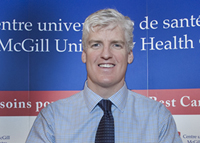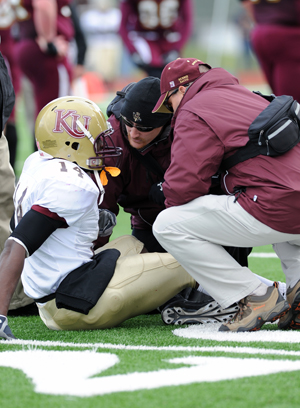MUHC doctor and patient tackle concussions head on

Dr. J. Scott Delaney
Though awareness has been growing rapidly about the risk of concussion in contact sports, thousands of cases continue to occur every year in Canada in young athletes. Unfortunately, many are often misguided about their condition and its consequences. For this reason, Dr. J. Scott Delaney, from the McGill University Health Centre (MUHC), and his patient Matthew Schryver, teamed up to write the basis of what would become Bill 496, a proposed law for Quebec that would help to prevent and reduce the consequences of head injuries and concussions in students participating in school sports activities.
As an Emergency Medicine and Sports Medicine doctor at the MUHC and McGill and team physician for the Montreal Alouettes, Montreal Impact, McGill Football, McGill Men’s and Women’s soccer teams and the Cirque du Soleil, Dr. Scott Delaney is a true expert when it comes to sports-related head and neck injuries.
“In the Sports Medicine clinic I see a lot of athletes - particularly young athletes - with concussions from participating in school sports like football, ice hockey, soccer, rugby, downhill skiing and basketball,” says Dr. Delaney, who is also the research director of the MUHC Department of Emergency Medicine. “Many of these athletes are not coming into the clinic one or two days after a concussion, but several months after. They did not have the correct guidance at school in terms of what they should be doing related to their course loads, gym classes, and other activities.”
This was the case with Matthew Schryver, who was 14 years old when he suffered of a concussion during a rugby match. Dr. Delaney saw Schryver, for the first time, weeks after his injury occurred. “He was still symptomatic, not getting the ideal treatment and he was still doing many things that were putting him at risk for other concussions. He quickly became aware of the difference good concussion management makes. I took over his care and guided him back into school and into sports,” says Dr. Delaney.
 A few years after Schryver’s concussion treatment, he contacted Dr. Delaney again, wondering whether there was any jurisdiction in Canada that had legislation aimed at protecting and guiding young athletes at school when they suffer a concussion. Schryver was convinced that action was required when, to his surprise, he learned that there was no such legislation. This is when both Schryver and Dr. Delaney teamed up to draft their ideas leading to the introduction of Bill 496.
A few years after Schryver’s concussion treatment, he contacted Dr. Delaney again, wondering whether there was any jurisdiction in Canada that had legislation aimed at protecting and guiding young athletes at school when they suffer a concussion. Schryver was convinced that action was required when, to his surprise, he learned that there was no such legislation. This is when both Schryver and Dr. Delaney teamed up to draft their ideas leading to the introduction of Bill 496.
“The Bill is asking the Ministry of Education to set a policy and procedure that describes how to handle student athletes who have concussions,” says Dr. Delaney. “The plan is to have it set up before the next school year starts so that athletes, parents, teachers and school administrators are aware of what may happen to an athlete who has a concussion. Athletes are to be guided back into returning to school; then getting back into sports only after they have had a full reintegration into their studies.”
In fact, the Bill puts emphasis on education and awareness so that student athletes and their entourage know how to prevent and reduce the consequences of head injuries and concussions and how to recognize and manage their symptoms. Moreover, the Bill asks for the immediate removal of a student who has or may have sustained a head injury or concussion from a school sports activity. It also asks that a student only return to a sports activity or to learning once it has been authorized by a qualified health professional trained in the evaluation and treatment of head injuries and concussions.
Bill 496 was tabled in the National Assembly on October 30, 2013.